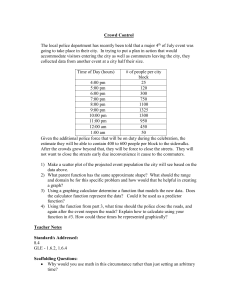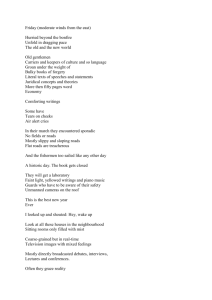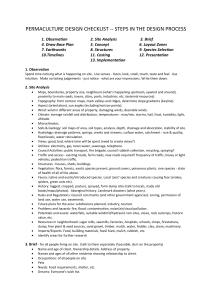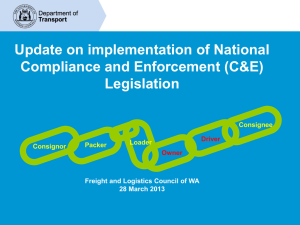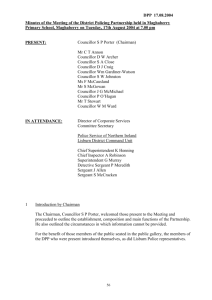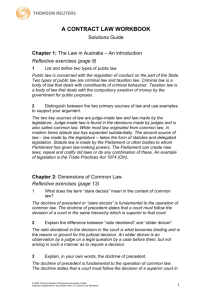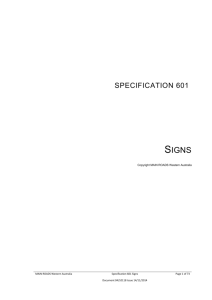AUSTRALIA'S THREE LEVELS OF GOVERNMENT
advertisement
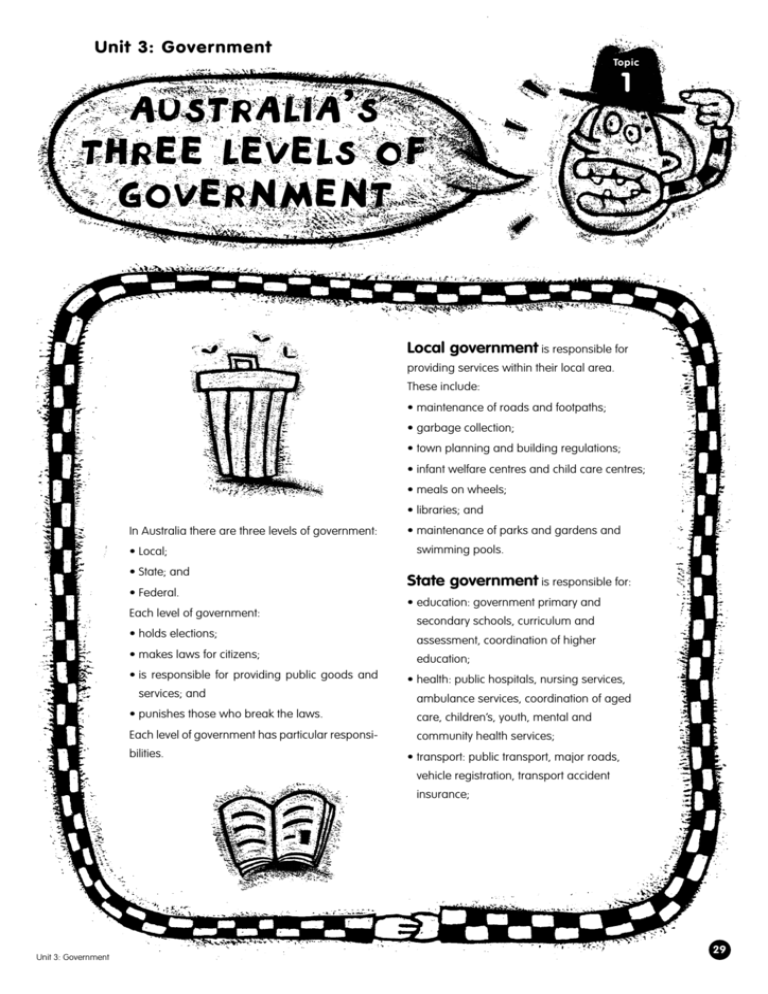
Unit 3: Government Topic AUSTRALIA’S THREE LEVELS OF GOVERNMENT 1 Local government is responsible for providing services within their local area. These include: • maintenance of roads and footpaths; • garbage collection; • town planning and building regulations; • infant welfare centres and child care centres; • meals on wheels; • libraries; and In Australia there are three levels of government: • Local; • State; and • Federal. Each level of government: • holds elections; • makes laws for citizens; • is responsible for providing public goods and services; and • maintenance of parks and gardens and swimming pools. State government is responsible for: • education: government primary and secondary schools, curriculum and assessment, coordination of higher education; • health: public hospitals, nursing services, ambulance services, coordination of aged • punishes those who break the laws. care, children’s, youth, mental and Each level of government has particular responsi- community health services; bilities. • transport: public transport, major roads, vehicle registration, transport accident insurance; Unit 3: Government 29 Topic 1 Federal government is responsible for: • defence; • foreign policy; • immigration; • trade and commerce; • airports and air safety; • state development: encouraging investment, employee relations, employment, workers’ compensation, information technology, sport, recreation, racing and gaming, tourism; • natural resources and environment: agricultural development, electricity and gas supply, water supply and sewerage, forestry, land management, conservation and environment protection, national parks; • law and order: courts and tribunals, legal aid, • post and telecommunications; • employment and unemployment strategies; • national public works; • social services such as pensions and family support; • Medicare and health funding; • post-secondary education; and • currency. police, prisons; • community services: disability services, child protection, adoption; • housing: public housing, rental assistance; • fair trading and consumer affairs; and • fire and emergency services. 30 Unit 3: Government Topic 1 Classroom discussion Discuss the answers to the following questions in class. What would happen if… • there was no rubbish collection? • there were no health regulations for restaurants? • roads were not maintained? • Australia didn’t have a defence force? • there were no dog or cat regulations? • there were no public libraries? • each State government produced its own coins? • there were no laws against criminal behaviour? • there were no plans or protection for the environment? • there were no building regulations? • people could migrate to Australia without first making an application? Unit 3: Government 31 Topic 1 Which level of government? Which level of government would you contact if: 1. Local State Federal Someone from overseas wants to come and live with you in Australia permanently? 2. Your rubbish wasn’t collected on rubbish day? 3. There are potholes in your road? 4. You have a query about your income tax return? 5. You are unemployed and want to obtain unemployment benefits? 6. Someone trespasses on your property? 7. You want to light a fire in your backyard? 8. The neighbours play loud music in the middle of the night? 9. You want to join the army? 10. You would like to improve the facilities at the school your child attends? 11. You want to enquire about a police matter? 12. You want improvements to the ambulance service in your area? 13. A senior secondary college wants approval to build a new computer centre? 14. You want your elderly mother to receive the meals-on-wheels service? 15. You want your baby to be inoculated against measles at the local health centre? 16. You want to make a claim to Medicare for your medical expenses? 17. You are campaigning to have a new sport and recreation centre built in your area? 18. You wanted to get on the list to receive accommodation in public housing? 19. You want to obtain a parking permit? 20. You are unhappy about aircraft noise at night? 32 Unit 3: Government Topic 1 Local government research exercise Use local newspapers and the Municipal Association of Victoria internet site www.mav.asn.au to research the answers to the following questions: a. What local government area do you live in? b. Is your local government area a city, borough, rural city or shire? c. Describe the special characteristics of your local government area. For example, you may live in a small rural shire with four small towns. d. List the names of five special facilities and features of your municipality. For example, parks, schools and sporting grounds. e. What improvements can you suggest to make your local area a better place to live? f. Who would you contact to make those improvements? g. Are there any further actions you can take in order to encourage the implementation of the improvements you have suggested? h. How many councillors are there on your local council? How long is the term of office for a local councillor? i. When were elections last held in your local government area? j. When is the next local election due? k. Do you think your local council is effective in making your area a good place to live? Give reasons for your opinion. Unit 3: Government 33 Topic 1 1. In groups, choose an area of council responsibility and create an annotated visual display that highlights how the council supports the area and the services that are available through the council. Some examples might be: • special needs groups – aged services, youth, mothers; • sporting and recreational facilities; • small business; or • dealing with pets. Alternatively, investigate an area of concern in your local community and what the council could be doing about it, e.g. homelessness in the area, a dangerous intersection, an environmental concern. 2. Do young people have a voice in your community? Research the following and write a report that outlines the following information: • Does your local council have a youth policy? What are its main priorities? (See if you can obtain a copy). • Does your local council have a councillor responsible for dealing with issues that effect young people in your community? If so how can they be contacted? • Outline the activities/services/facilities your council provide for young people. • How much money from the budget is allocated to youth initiatives in your area? • Make a conclusion: How well does your council provide for young people? Do you think it could be doing better? Justify your answer using the information that you have gathered. 34 Unit 3: Government Topic 1 State government responsibilities Elections provide citizens with the opportunity to vote for a government. Once elected, governments then organise many aspects of our society. For example, the Victorian Government is responsible for spending about $31 billion each year. About 85% of this is spent in seven main service areas: Department 2005/06 Budget ($ billion) Human Services (including health and welfare) 11.5 Education (including government primary and secondary schools) 7.6 Infrastructure (including roads and public transport) 3.8 Justice (including prisons, police and the courts) 2.7 Sustainability and Environment 0.9 Premier and Cabinet (including Arts Victoria) 0.5 Innovation, Industry and Regional Development 0.3 State Government is also responsible for making and enforcing many of the laws that affect our daily life, including laws about: • transport, such as driving age; • education, such as school leaving age; • shop and car theft, and other criminal acts; and • drug and alcohol use. Unit 3: Government 35 Topic 1 1. Provide some examples of State government expenditure in your community. Which of the seven main State Government expenditure areas apply to your examples? 2. How do you think the following State laws might impact on your daily life? • The Education Act 1958, • The Equal Opportunity Act 1995, • The Road Safety Act 1986, • The Consumer Affairs Act 1972, • The Summer Time Act 1972. Consider: What rights and responsibilities might they involve for you or your family? Do they affect you regularly/seriously? Provide an estimate of their importance on your life. You will find a full text of Victorian legislation at www.parliament.vic.gov.au. Maintain a journal of services used Keep a journal for a week – with a short description of the services you use and how important these services are to your daily living. An example of a possible layout for the journal is set out below: My journal of government services used in the week Monday by Service Level of government responsible How important it is to my life Used the library for research for school assignment Local government I like to use the library because I can study there without interruption from my little brothers Tuesday Wednesday Thursday Friday Saturday Sunday 36 Unit 3: Government Topic 1 Issues collage 1. Collect 8 – 10 articles in recent daily and local newspapers dealing with various government-related services (e.g. hospitals, education, environmental issues, motor vehicle/roads etc). 2. Categorise each according to which level of government has prime responsibility for the related areas. 3. Provide a brief description of the issues that are the subject of each of the articles. Are there any criticisms of the way the particular levels of government have dealt with the issue? Do you agree/disagree? If so, why? 4. Use your articles and your comments to create a collage or poster illustrating the role and responsibility of each of the levels of government. 5. Select one of the issues which most concerns you and write a letter to a local Member of Parliament or Councillor setting out your views about the changes that you wish to see happen. Shared responsibilities between governments There are some service areas where responsibility is shared between two or even all three levels of government. Some examples are: • Universities and TAFE Colleges are funded by both the Federal and State Governments; • The hospital system is funded by Commonwealth and State Governments, and administered by State government; • The criminal justice systems (courts and police) are mostly under State jurisdiction, but there are also Federal courts and police who have authority over certain matters. Why do you think responsibilities for these services are shared between governments? What might be some advantages and disadvantages in having more than one level of government having responsibility for some services? Unit 3: Government 37
